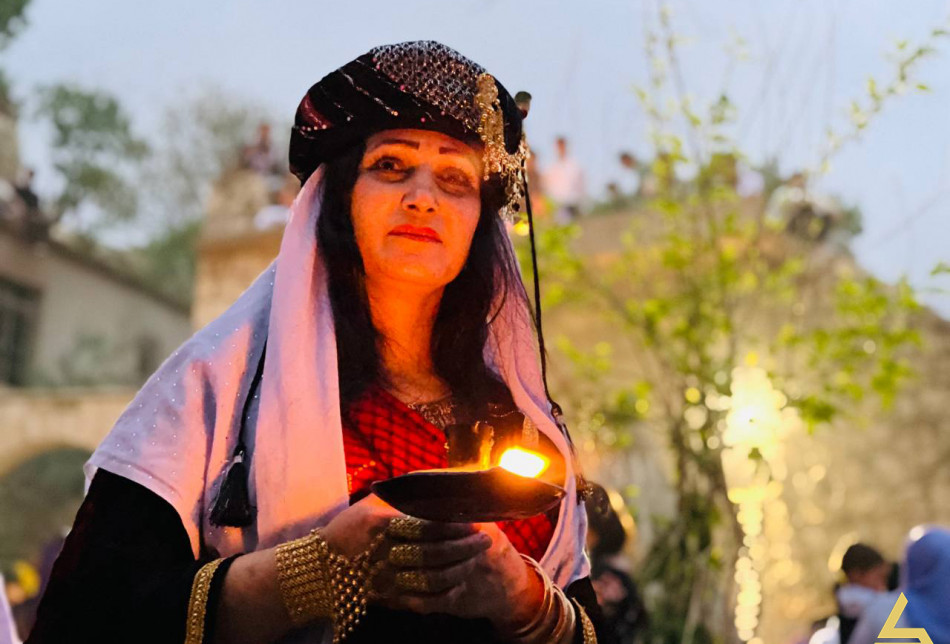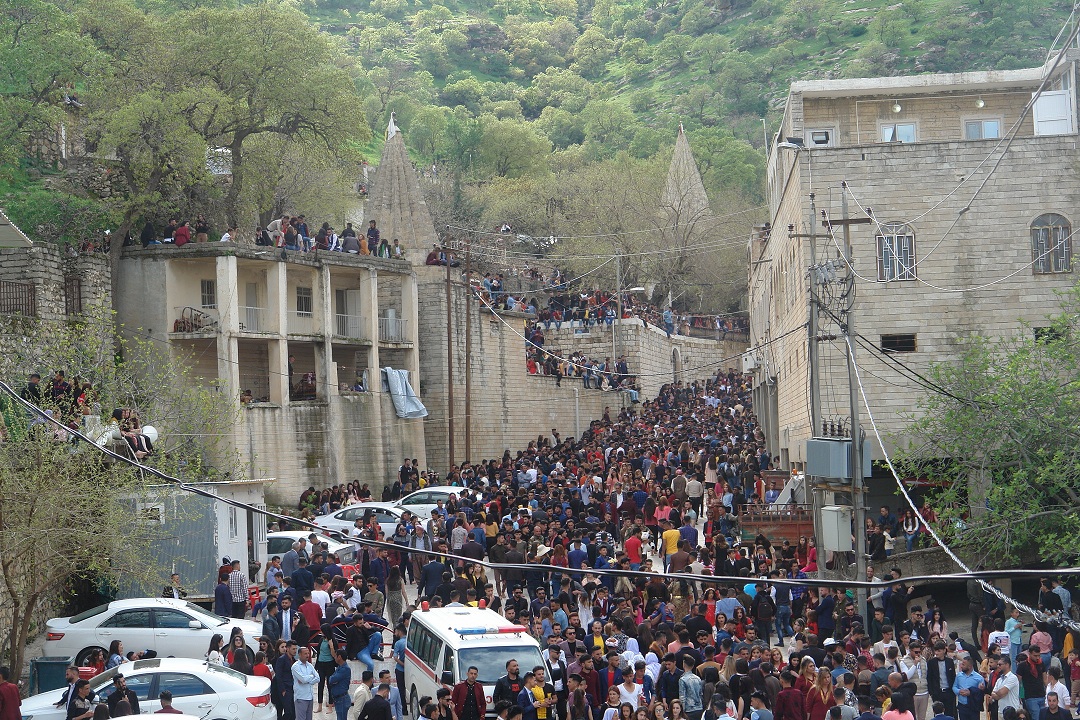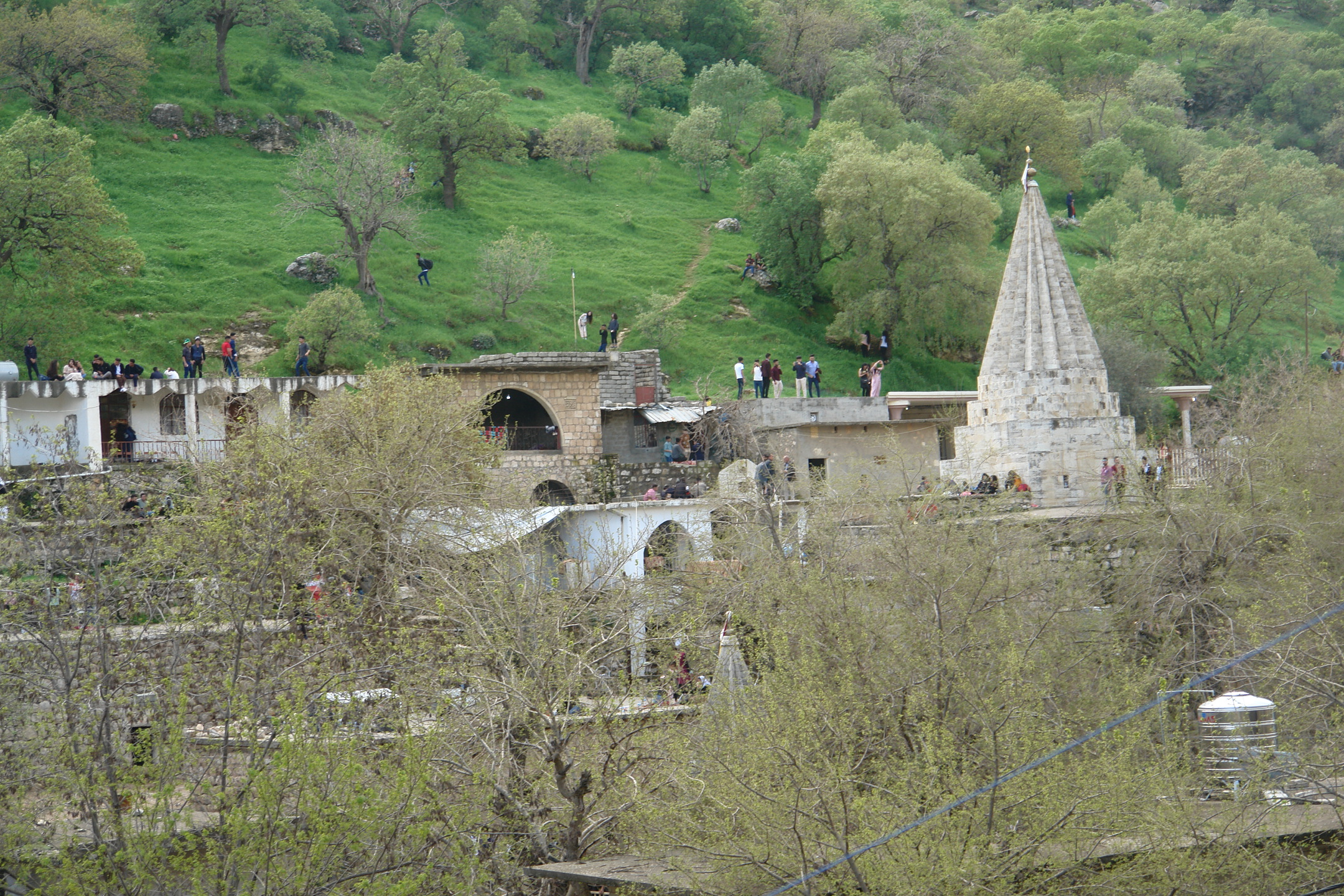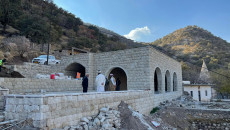Hundreds of Ezidis in Shingal (Sinjar) and other parts of Nineveh are not allowed to enter the Lalish temple for religious worship at security checkpoints in the Kurdistan Region of Iraq KRI every year, for political and military excuses.
According to a journalistic investigation by KirkukNow, which has talked to dozens of sources from different sections of the Ezidi community, including those who have been prevented, it appears that "hundreds of Ezidis", especially residents of Shingal district, home for the non-Muslim community, activists and journalists Even clerics have not been allowed to visit Lalish for several years.
The obstruction, which the military officials and the ruling party do not deny, is contrary to the texts of the Universal Declaration of Human Rights, the permanent constitution of Iraq, the applicable laws of the KRI, the agenda of the Kurdistan Regional Government KRG and Ezidism.
Fakhir Khalaf, an Ezidi religious minister in Shingal, has not been able to reach Lalish temple in Shekhan district of Duhok province, under the KRG, for any religious worship for three years.
“People from Shingal have been prevented from going to Lalish for three years.”
He says the reason for the ban is that the dominant Ezidi figures in Lalish, the emir and Babasheikh, unfortunately are affiliated to a political party.
He said that he conveyed his message to the embassies in Baghdad.
"This is the role of the emir to speak up. He must facilitate for the people, especially the people of Shingal to visit Lalish, not to ban them," Khalaf added.
The institution responsible for managing the affairs of the Ezidis within the Ezidi Spiritual Council is led by the Emir of the Ezidis. This institution serves as an umbrella for Baba Sheikh (the spiritual leader), the Sheikh Al-Wazir (Chief minister), and the head of the Qawwalin (Storyteller), issuing all decisions related to the Ezidi community.
The term "Ezidi" originates from the word "Ezdan," meaning God, representing an ancient monotheistic religion that is considered an extension of the Mithraic religion. The sacred Ezidi texts consist of two parts: The Book of al-Jalwa and the Black Book (Bushafa Rash), as well as sayings, verses, and poems, all written in the Kurdish language (Kurmanji dialect).
Ezidism is an ancient Middle Eastern monotheistic ethnic religion that believes in one God who created the world and entrusted it to seven Holy Beings, known as Angels, with Melek Taus being the prominent leader with authority over the world.

Saeed Shamo, a civil society activist in Shingal, has not seen Lalish for five years because he is at the list of KRI security checkpoints.
“From 2014, after we were displaced to Duhok, I was critical in my posts so I was questioned over 20 times. When we returned to Shingal in 2018, I could not return to the Kurdistan Region and visit Lalish,” Shamo told KirkukNow.
The Islamic State of Iraq and the Levant (ISIL) took control of Shingal in August 2014; enslaved 6,417 Ezidis, of whom 2,700 are still missing, killing more than 1,000 and displacing 360,000, some of whom have not yet returned, according to the Kurdistan Regional Government's Bureau for Rescue of Abducted Ezidis.
“They stop me at the security checkpoints, while I have the right to perform religious duties in the Lalish temple,” Shamo said. “Lalish is a religious place and it is our right to visit it.”
They stop me at the security checkpoints, while I have the right to perform religious duties in the Lalish temple
Lalish Temple is the most important holy place of the Ezidis and is located in a mountainous area in Sheikhan district, 60 km northeast of Mosul. The office of the spiritual council is also based in Sheikhan.
Lalish was built in 300 BC for religious rituals. Ezidis from different provinces and cities flock there to perform their religious ceremonies.
Visiting the Lalish temple is one of the main pillars of Ezidism along with prayer, fasting and others. Ezidi pilgims head to Lalish mostly on major occasions such as New Year's Eve or Red Wednesday in April or Jama'a in October each year.
The latest obstacle to a number of Ezidis last month, especially at the Sihela checkpoint, according to KirkukNow, was for the Jama Eid celebrations, which began on October 6 and lasted seven days, on which thousands of Ezidis celebrated in the temple of Lalish.
150,000 Yazidis attended the Jama holiday this year and about 200 people go to Lalish on normal days, according to statistics from the Lalish temple for KirkukNow.
Luqman Mahmoud, spokesman for the Lalish temple, told KirkukNow that no one has been prevented from entering the temple. “No one has informed us that they have been prevented or filed a complaint or complained to the Ezidi officials. One the contrary, most of the visitors are the residents of Shingal, peripheries and the displaced in the camps.”
However, those who spoke to KirkukNow stressed that the issue of obstruction has been conveyed to all the Ezidi personalities and officials.
“We will collect all the information about the obstacles and then make it into an official letter and file a complaint so that no one is banned,” Khairi Ali, head of Petrichor Human Rights Organization in Shingal, told KirkukNow.

According to the Iraqi Constitution, all religious rights of all individuals are protected in terms of freedom of belief and religious practice, and the state is obliged to ensure freedom of worship.
According to the Law on Protection of the Rights of Communities in Kurdistan No. 5 of 2015, there are eight religious communities, including the Ezidis, whose right to worship is protected and should not be prevented. It states their extinction or marginalization is prohibited, have freedom of thought, expression, meeting and establishment of societies.
Article 18 of the Universal Declaration of Human Rights also states “everyone has the right to freedom of thought, conscience and religion; this right includes freedom to change his religion or belief, and freedom, either alone or in community with others and in public or private, to manifest his religion or belief in teaching, practice, worship and observance.”
"The obstacle exists after the events of October 16, 2017. Hundreds of people are prevented from entering Lalish from Sinjar every year at the Nawaran checkpoint and several other places, including independent people and activists or people belonging to different forces in Sinjar," Ali said.
Most of the governance of Sinjar was in the hands of the Kurds/mostly the Kurdistan Democratic Party KDP until October 16, 2017, when tensions escalated between Baghdad and Erbil after the Kurdistan Region's independence referendum, and the Iraqi Security Forces ISF returned to Shingal and other disputed territories.
Since then, Shingal has more than two official and unofficial administrations, with about 10 different armed forces, including the Iraqi army and pro-Shiite paramilitary of Popular Mobilization Forces PMF (Hashd al-Shaabi).
Those being prevented are affiliated to the PKK and Hashd al-Shaabi
KirkukNow has been trying to get statements from senior security officials and those in charge of checkpoints in the KRI with Nineveh and Shingal for several days, but the efforts were in vain.
Mirza Khalaf, commander of the Kurdistan Regional Government's Peshmerga command in Shingal, confirmed the blocking of the checkpoints and told KirkukNow, “Those who are prevented from entering Kurdistan belong to PKK (Kurdistan Workers Party) and Hashdi Shaabi guerrillas. They are enlisted at every checkpoint between Shingal and the Kurdistan Region and they are not allowed.”
The PMF is an official force in Iraq by law, and there is no legal text that considers the Kurdistan Workers' Party (PKK) a banned force.
"Dozens of people who have been prevented before, their problems have been resolved through us when we talked to the checkpoints, "but we will not interfere in the prevention of people affiliated to the PKK and Hashdi Shaabi," the Peshmerga commander said.
According to the agenda of the current cabinet of the KRG, no one should be punished for political beliefs and party affiliation.
Idris Zozani, spokesman for the 14th branch of the Kurdistan Democratic Party (KDP) in Nineveh, told KirkukNow that the security agencies only prevent people who are “suspected of having links with the terrorist organization PKK or Daesh (ISIS). The aim is to protect the national security of the Kurdistan Region.”
“Those who belong to the PKK and Hashdi Shaabi what they want to do in the Kurdistan Region? If they come to Kurdistan, they come to disrupt the security of the region. Others are wanted so once they come to the region they will be arrested per court order and the obstruction is within the framework of legal procedures,” he said, without explaining which procedures and laws were followed.
Some Ezidis in Shingal still do not recognize the Mir and Babasheikh; Three figures have introduced themselves as the emir of Shingal, after Hazim Tehsin Beg was appointed as the emir of the Yazidis in Iraq and the world in a ceremony at the Lalishi temple in Sheikhan district.
Earlier, Hazim Tahsin Beg and Ali Elias, as the "Mir" and "Babasheikh" of the Yazidis visited Shingal, but their efforts for reconciliation with those rejected their nomination, election and appointment, were fruitless.
The head of Petrichor, said they have informed the Iraqi officials and the international organizations about the issue.
"Anyone of any religion should not be prevented from visiting their holy places. Those who intend to visit them have committed no crime and just want to pilgrimage and perform religious duties," said Ali.
Except for Lalish; The Yazidis have several other religious sites and shrines in different parts of Nineveh province, some of which were destroyed by the Islamic State of Iraq and the Levant (ISIL).
Ezidis speak Kurmanji, one of the two main Kurdish dialects. Part of the Ezidi community considers Ezidism both a distinct religious and ethnic identity and does not identify themselves as Kurds.
The are about 550,000 Ezidis in Iraq,over 100,000 of whom have migrated. Those who remain in displacement or majority are located in Sheikhan district (north of Mosul, partly under Duhok and partly on Nineveh) and Shingal district (120 km west of Mosul). and administratively belongs to Nineveh province).






